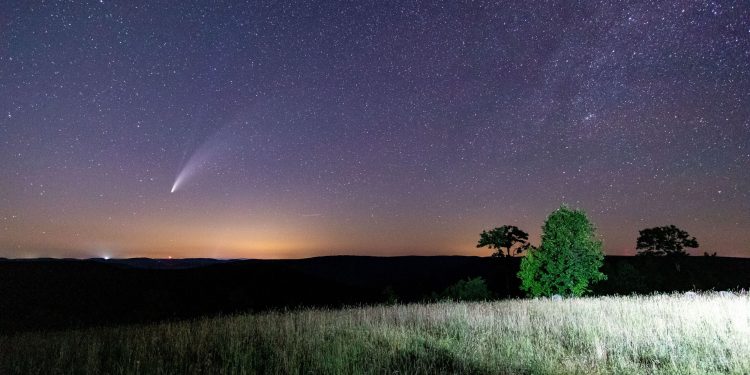The Cameron County site is an hour away from the internationally renowned — and often very crowded — dark sky viewing at Cherry Springs State Park.
Tanisha Thomas of Spotlight PA
This story first appeared in PA Local, a weekly newsletter by Spotlight PA taking a fresh, positive look at the incredible people, beautiful places, and delicious food of Pennsylvania. Sign up for free here.
This story first appeared in PA Local, a weekly newsletter by Spotlight PA taking a fresh, positive look at the incredible people, beautiful places, and delicious food of Pennsylvania. Sign up for free here.
A former landfill in Pennsylvania’s least populated county may become the state’s newest stargazing attraction.
Officials with Cameron County and the Lumber Heritage Region of Pennsylvania promotional group are working together to revamp the county-owned site. Proposed enhancements include a trail, parking, a wildlife viewing area, a dark sky observation field, and more.
The 99-acre site is an hour away from the internationally renowned — and often very crowded — dark sky viewing at Cherry Springs State Park, and 30 minutes away from Route 6, “one of America’s most scenic drives,” according to National Geographic.
“The goal is to develop this site to allow for public access and use of the site, and hopefully serve as a hub for some education and outreach for dark sky awareness, [light] pollution, and increasing the dark skies in the area,” explained Rowan Crisp, the education and outreach administrator for the Lumber Heritage Region group.
Because the area is a reclaimed landfill and former strip mine, Crisp said the goal is to not disturb the environment in the process of creating amenities — meaning large buildings and excavations are out while lighter options like a pavilion and elk viewing area are in. (Cameron County is home to a portion of Pennsylvania’s engineered herd of wild elk, the largest east of the Mississippi.)
“Right now everything is on the table, but we do have to be mindful that we don’t want to disturb the soil too much, and we don’t want the area to lose its wild attractions,” Crisp added.
Once updated, the site could bring in 10,000 visitors annually, estimated Cameron County Commissioner Josh Zucal. He said the prospect of more tourists has been met with excitement and reservation from locals, some of whom worry the telescope-toting throngs could diminish the untouched aura of the Pennsylvania Wilds region.
Zucal said that tension is front of mind as the county considers the site: “We do want these people in the county. We want them coming to experience what we have, and to have the opportunity to possibly live here. But at the same time … we don’t want to change our dynamic.”
The number of visitors will likely grow if the site obtains international dark sky certification, which Crisp said is a possibility. Cherry Springs, in neighboring Potter County, already has that designation and attracts 85,000 to 90,000 visitors annually. Stargazing there has been described as a primal experience and draws people from around the world.
Crowding concerns weren’t the primary focus of a June public meeting about the Cameron County project, but lots of questions were raised that still need to be answered.
Among the open topics: What’s the best way to deal with the site’s “unbearable mosquitoes”? (Bat houses were one idea.) Is Wi-Fi needed for navigation aids? (Cell service is limited.) How will developers ensure crowds don’t scare off the area’s skittish elk? And can the site be made available in the winter, when nights are longer and stargazing conditions ideal?
The site, which consists of little more than a dirt road now, is currently open to the public from April to October.
And while it sits in one of the darkest zones in the entire state, light pollution is possible.
The firm brought in to help with the planning effort, Virginia’s Lardner/Klein Landscape Architects, said as much in June’s meeting. The firm pointed to nearby Emporium, the county’s largest town, with roughly 2,000 residents, as a potential source of light pollution.
Spotlight PA reported in 2023 that light pollution was a growing concern for officials, including Zucal, across the Pennsylvania Wilds, where darkness is a natural resource. After a dip during the pandemic, light contamination in places like it is slowly creeping back up.
Zucal is eyeing a countywide light pollution ordinance, “so that we can have one umbrella for everyone.”
In the meantime, he’s asking people with thoughts about the dark sky project to chime in.
A second public meeting is tentatively planned for October. Crisp said when the plan is finalized and approved, a final meeting will be held to share the details.
Members of the public are able to submit ideas and suggestions to be incorporated into a master site plan by emailing the planning team here.
“We are planning to have this plan wrapped up by the beginning of next year,” Zucal added. “This is the time for anybody who wants to have any kind of feedback.”
—Newsletter Editor Colin Deppen contributed to this report.



